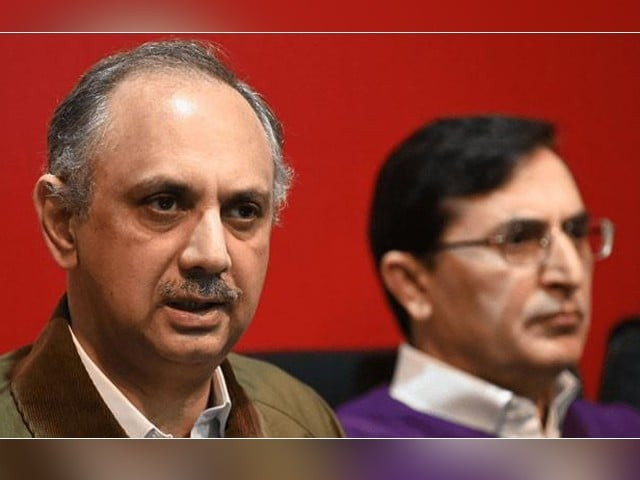ISLAMABAD:
Leader of the Opposition in the National Assembly Omar Ayub on Monday put the government on the spot, demanding the immediate appointment of a new chief justice of Pakistan to quell growing speculations that the current CJP, Qazi Faez Isa, might receive a tenure extension.
With rumours swirling that the ruling coalition was contemplating constitutional amendments to prolong CJP Isa’s tenure, Ayub warned that any such manoeuvres would be met with fierce opposition.
“The chief justice should be appointed on the principle of seniority,” Ayub asserted. “The government should announce the name of the new chief justice now.”
Ayub also accused Justice Isa of de-seating two PTI-backed MNAs “at the behest of many people” to bolster the government’s majority, a tactic he vehemently condemned.
“We [PTI-SIC] condemn this; Qazi Faez Isa’s replacement should immediately be announced,” he asserted.
The PTI leader also demanded immediate clarification on the matter from the Federal Minister for Law, Azam Nazeer Tarar, who reassured that the appointment of the CJP would strictly adhere to constitutional provisions.
The law minister said that under the existing provisions of the Constitution and laws, a senior judge from the high courts could be appointed as chief justice by the judicial commission and parliamentary committee.
Tarar also cited the example of a judge from the Lahore High Court (LHC), ranked fifth in seniority, who was appointed chief justice by the judicial commission. He further stated that the 18th Amendment mandates the appointment of the most senior judge as the Supreme Court’s chief justice.
“The matter of appointing the chief justice of the Supreme Court can only proceed in accordance with the Constitution,” Tarar said.
Terrorism
Moreover, the minister accused the former PTI government of resettling terrorists in Pakistan, recalling that not a single meeting regarding the National Action Plan was held during PTI’s tenure.
“The PTI is responsible for the blood being spilled today,” Tarar asserted.
Though Tarar urged that the nation will have to stay united against terrorism, he incorporated that PTI promoted terrorists during its four-year tenure.
In response to various questions, Tarar mentioned that a task force has already been established to address issues related to Independent Power Producers (IPPs).
He noted that while power projects were initially set up during a period of 18-hour load-shedding, the country’s energy needs have since evolved.
“The prime minister has constituted a task force to review IPPs’ matters,” he said, adding that the task force will soon present its recommendations.
Tax rates of mobile companies
The law minister also informed the National Assembly that the responsibility for setting tax rates lies with the Federal Board of Revenue (FBR) and provincial tax authorities.
Mobile companies cannot increase tax rates unless they receive official notification from the FBR or the relevant provincial authorities.
During the Question Hour, he clarified that tax rates have not been altered recently, except as outlined in the national or provincial budgets.
He informed that the tax rates for both provincial and national taxation are uniform across all mobile companies, with all collections being deposited with the relevant revenue authority.
He further explained that taxes are imposed according to the procedures established by the relevant tax authorities of the government. These taxes are charged both on mobile recharges and based on the usage of services.
He clarified that recharging and service usage are treated as separate activities, and taxes are applied accordingly.
The charging mechanism, he stated, is aligned with the directives of the national and provincial revenue collection authorities. He reiterated that tax rates are issued by the relevant authorities, and mobile companies have no role in setting these rates.
Once the rates are established, mobile companies are required to charge, collect, and deposit the taxes as per the notified ratios.
ICT Local Government Bill Passed
Meanwhile, the treasury benches passed the Islamabad Capital Territory Local Government (Amendment) Bill, 2024. The bill mandates that “The Election Commission shall delimit union councils into nine wards for the election of members on general seats.”
In Section 11 (Union Council), the amendment outlines that “A Union Council shall consist of the following members elected under Chapter V: (i) Chairman and Vice Chairman, as joint candidates; (ii) nine general members; (iii) one woman; (iv) one peasant or worker or businessman or technocrat; (v) one youth member; and (vi) one non-Muslim.”
The bill further clarifies the election process for UC members, stating that all nine general members shall be directly elected by the registered voters in the respective UC.
These general members shall elect, through secret ballot, one woman, one peasant, worker, businessman or technocrat, one youth member, and one non-Muslim member.
The secretary of the UC will then convene and preside over a meeting to elect a chairman and vice chairman as joint candidates from the members mentioned in serial numbers (ii) to (vi) of Section 11 of the Act.
The statement of objects and reasons provides a brief background leading to the amendment of the Islamabad Capital Territory Local Government Act, 2015. The Act, initially promulgated in 2015, aimed to establish an elected local government system.
The term of the ICT Local Government expired on February 14, 2021, obligating the federal government and the Election Commission of Pakistan to conduct elections within 120 days, in accordance with Section 219(4) of the Elections Act, 2017.
To facilitate the necessary arrangements for the local government elections in Islamabad, the ECP requested the issuance of a notification regarding the number of reserved seats in the Metropolitan Corporation Islamabad (MCI) and an amendment to Section 17 of the ICT Local Government Act, 2015.
The amendment replaces the words “Representation of the People Act, 1976” with “Elections Act, 2017,” as the former was repealed under Section 241(d) of the Elections Act, 2017.
During the session, Ayub expressed gratitude to Speaker NA Ayaz Sadiq for issuing production orders for Haji Imtiaz Chaudhry, allowing him to attend the session.
“This is a commendable tradition, and I want to praise Ayaz Sadiq for it,” Ayub remarked.
Haji Imtiaz, who was recently arrested while travelling to his village to visit his ailing mother, finally reunited with her at the parliament.
The emotional reunion saw both mother and son in tears as they embraced. The NA speaker had issued a production order for Haji Imtiaz after his party moved a privilege motion against several Punjab police officials.
The motion stated that Haji Imtiaz was arrested by law enforcement authorities on July 24 without prior approval from the Speaker.
During the session, the house condemned the recent terrorist activities in Punjab, Balochistan, and other regions.










